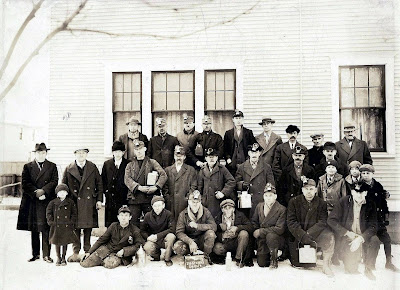Scovill Run, the town where my main character and her family live and work, is fictional, but it's based on many towns encountered in my research, towns either overtaken by the dirty business of mining, or spring or of nowhere to support a mine.
The towns were almost wholly owned by the mining companies. There were no other jobs tolerated outside mine work. Men who refused to go underground had to leave to find work. Houses were tied, so a family never really owned their home, it even rented it properly. No rent was paid; part of a miner's salary was out toward the rent. The rest was deposited at the company store, where all provisions had to be purchased, often at prices higher than found outside the town. But since miners were paid in scrip, not cash, transportation was not the only problem.
On the outside, a coal patch town might look like any other. There were houses, churches, and a shop with a post office. A community center where events took place, movies were shown and elections were held.
But the government of the town, such as it was, was in the hands of the coal company. They had their own private police force, the Coal and Iron Police, which terrorized families all over Pennsylvania. They dealt with efforts at unionizing with an iron hand, and if they went overboard on their administration of justice, there was no recourse. The CIP was disbanded in 1931, but they had almost complete control from the Civil War up until that point.Education in a coal town was minimal, going only through the eighth grade. Most boys left school before then, to work in the mines. By the time my book starts, it is illegal to hire a boy under the age of fourteen, but of course it still happened, and it was at least an improvement on the days when boys started on the breaker, sorting coal, at the age of five or six.
By the time the Depression was in full swing, the demand for coal had begin to slack - oil was the coming thing, and many household in the cities were changing over to oil heat. Still, coal was necessary for industry, and the mines kept operating, but often the miners' hours were reduced to a point just above poverty, and, dependent on the company for food and housing, and deprived of education and any opportunity of other work, they had few options.
.jpg)


3 comments:
Interesting post on background as my father-in-law was from Frackville PA. As a young boy he was the canary carrier. I believe he was also involved with the Mollie McGuires group fighting coal companies complete ownership of the miners—-another form of “slavery” I think!!
Always enjoy your posts, Renita in NC
Thanks, Renita! One of the things I love about writing historicals is the research - you never know what you're going to find, and then to get comments from people who "get it" is even better!
My mother in law was the daughter of a coal miner, down in West Virginia. She had many stories of life as a young child. One I'll never forget is when she was 3, she was given to the couple 'across the holler' because they 'didn't have any children.' It didn't work out, so she came back to her family.
She remembers the year they moved up to Toledo, and how surprised she was when she went to school, and all the kids wore shoes - All Year!
Her father got a job for the C & O railroad, the reason they moved up here, and died of black lung disease.
It sounded like a tough life, but they were a loving family, and I have tried to write down the stories she told, for my kids.
Thanks for sharing this
Post a Comment